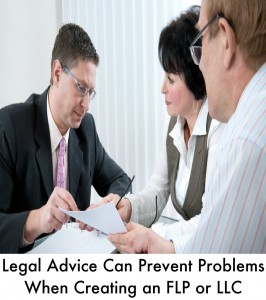 Although family limited partnerships (FLPs) and limited liability companies (LLCs) can be an effective estate planning tool for family owned businesses and other assets, there is some risk associated with their use when an experienced estate planning advisor is not consulted. We discuss the basic structure of these types of estate planning tools as well as a list of tips to avoid problems.
Although family limited partnerships (FLPs) and limited liability companies (LLCs) can be an effective estate planning tool for family owned businesses and other assets, there is some risk associated with their use when an experienced estate planning advisor is not consulted. We discuss the basic structure of these types of estate planning tools as well as a list of tips to avoid problems.
A family limited partnership is one way that assets or a family business may be owned and operated by members of a family. The FLP may be structured in a variety of ways. However, it is common to make a parent the general partner with the authority to manage the business operations and decision-making while the parent’s children may be limited partners. This means that the personal assets of the kids are not susceptible to debt enforcement for the liabilities of the FLP. A LLC must comply with the particular requirements of state law which can vary somewhat, but the general structure of this form of enterprise provides many of the benefits of incorporation while being treated like a partnership for tax purposes.
While both of these legal entities offer a plethora of potential benefits that include protection from debt enforcement by aggrieved former spouses or business creditors, devaluing of assets for estate tax calculation purposes and avoidance of probate, these estate planning tools can backfire when people proceed without advice and assistance from estate planning professionals. Some judges may conclude that an FLP (LLP) is basically a “testamentary substitute” to keep the assets out of a decedent’s estate. This can negate many of the benefits of the FLP or LLC structure, such as the protection of assets from creditors and avoidance of federal estate tax. We have provided some tips below to reduce the risk that a court will make such a determination:
Business Purpose:
The entity should have a legitimate business purpose beyond mere minimization of tax obligations. In one case where the judge deemed an FLP to be a mere “testamentary substitute,” the bulk of the assets were placed in the trust with no change in the assets.
Plan Ahead:
If the trust is set up shortly before the settlor passes away, the trust is more likely to be viewed as merely a tax avoidance tool. The earlier the trust is established the less likely it will be deemed a testamentary substitute.
Distributions:
At a minimum, some distributions should be made by the LLC or FLP. If all or the bulk of the assets remain in the entity while access to the assets is allowed to the parent, this can be a problem.
Aging of Principle Assets Prior to Distribution:
It may be advisable to allow at least a little time after transferring the assets into the trust before making gifts of limited partnership interests to family members. Further, all of the requirements for transfers and applicable documents should be completed before the gifts are made to family members.
Investments Not Limited to Parent:
Other participants in the LLC or FLP also are advised to make investments into the entity upon formation. If the parent is the only investor, this may be viewed skeptically.
Observe Formalities:
A kit like that used for corporations should be maintained for records and documents along with issuing certificates evidencing ownership interests. Meetings of the participants should also be held periodically with the minutes recorded. The participants may all want to have separate attorneys rather than one attorney. These types of arrangements make the entity look like it is more than a ruse to avoid estate taxes.
Asset Valuation for Estate Tax Purposes in a New Mexico Will Administration
The above information is designed solely to illustrate general principles of law, and does not constitute a specific legal opinion on individual cases. We suggest that you contact experienced legal counsel for a specific opinion tailored to your individual circumstances.
While this is certainly not a comprehensive list, these tips provide a good start to creating an FLP or LLC that looks like it exist for purposes beyond merely functioning as a testamentary substitute. If you have questions about setting up a family limited partnership or a limited liability company, our New Mexico Attorneys at Jay Goodman & Associates, PC offer a free consultation in our centrally located offices in Santa Fe and Albuquerque so that we can discuss your specific situation. Call us today to schedule your free consultation at (505) 989-8117 to learn about your rights and options.

Comments are closed